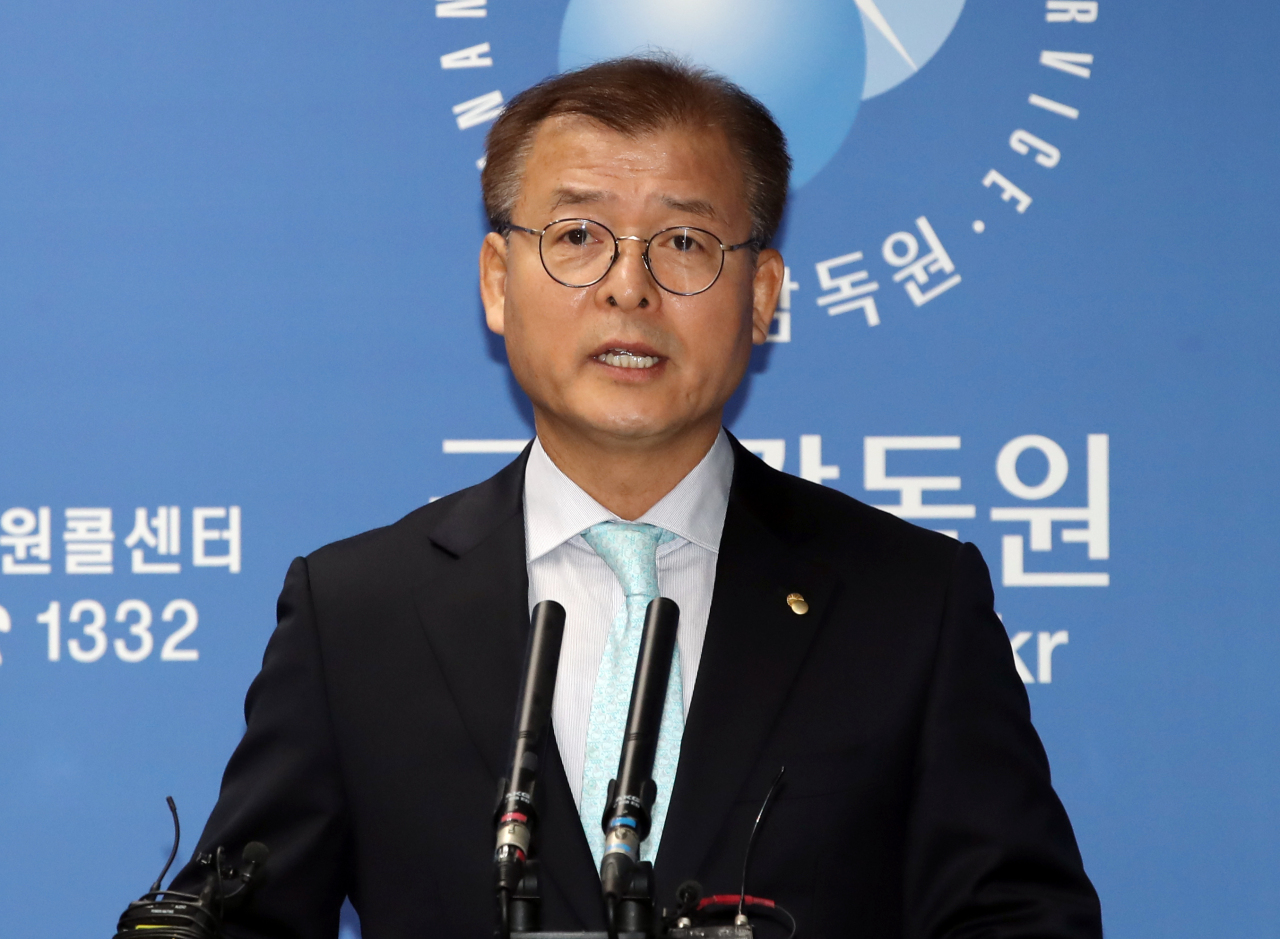Watchdog advises banks to partially cover losses from KIKO misselling
FSS says 6 banks failed to provide 4 local businesses with adequate information about risks, proposes payment of W25.5b
By Jie Ye-eunPublished : Dec. 13, 2019 - 16:33
Wrapping up long-stalled arbitration proceedings Friday to settle disputed sales of currency-option contracts, South Korea’s financial market watchdog advised local banks to compensate local businesses for up to 41 percent of the loss they inflicted.
At a press briefing, the Financial Supervisory Service’s Dispute Arbitration Committee urged six banks to pay about 25.5 billion won ($21.7 million) in total to four local businesses that signed “knock-in, knock-out” currency derivatives -- dubbed KIKO -- in 2008 or earlier.
Each of the four companies lost between 3 billion won and 80 billion won. The FSS concluded that the banks had failed to provide adequate information about the risks involved and recommended that they compensate the companies for part of the loss -- 15 percent for two companies, 20 percent for a third company and 41 percent for a fourth.
At a press briefing, the Financial Supervisory Service’s Dispute Arbitration Committee urged six banks to pay about 25.5 billion won ($21.7 million) in total to four local businesses that signed “knock-in, knock-out” currency derivatives -- dubbed KIKO -- in 2008 or earlier.
Each of the four companies lost between 3 billion won and 80 billion won. The FSS concluded that the banks had failed to provide adequate information about the risks involved and recommended that they compensate the companies for part of the loss -- 15 percent for two companies, 20 percent for a third company and 41 percent for a fourth.

Shinhan Bank is asked to indemnify 15 billion won and Woori Bank to pay 4.2 billion won. The Korea Development Bank and KEB Hana Bank are supposed to pay 2.8 billion won and 1.8 billion won, respectively. DGB Daegu and Citibank are expected to pay indemnities of 1.1 billion won and 600 million won, respectively.
The FSS’ proposed dispute settlement, however, is not mandatory. Banks could refuse to settle.
The KIKO contracts were signed from 2005 to 2008 by local small and medium-sized exporters that wished to hedge risks stemming from currency volatility.
Once the currency surpassed the ceiling, those companies would be obligated to sell twice the contracted amount to the banks at preset exchange rates, absorbing the exchange loss in the process. But the 2008 global financial crisis caused the Korean won to plunge 25.7 percent, leading to heavy loss for the firms involved.
Korea’s top court in 2013 cleared the banks of any fraud charges but said the KIKO products may have been missold, meaning the banks may have withheld crucial information about the potential for loss.
Besides the four companies, there are now nearly 150 other firms seeking dispute settlements by the FSS.
The FSS is expected to recommend that local banks and other KIKO buyers voluntarily settle their disputes based on its arbitration proposal for the four companies, while the Joint Countermeasures Committee has yet to express any views on the matter.
“The KIKO case has remained an unfinished task (for the FSS) despite prolonged disputes between local banks and companies. Revealing consumers’ damages from selling financial derivatives is the key to financial consumer protection,” said Jung Sung-woong, deputy governor of the FSS.
Meanwhile, the banks and firms in question have up to 20 days to decide whether to accept the financial authority’s settlement proposal.
By Jie Ye-eun (yeeun@heraldcorp.com)






![[From the Scene] Monks, Buddhists hail return of remains of Buddhas](http://res.heraldm.com/phpwas/restmb_idxmake.php?idx=644&simg=/content/image/2024/04/19/20240419050617_0.jpg&u=20240419175937)




![[Graphic News] French bulldog most popular breed in US, Maltese most popular in Korea](http://res.heraldm.com/phpwas/restmb_idxmake.php?idx=644&simg=/content/image/2024/04/18/20240418050864_0.gif&u=)




![[From the Scene] Monks, Buddhists hail return of remains of Buddhas](http://res.heraldm.com/phpwas/restmb_idxmake.php?idx=652&simg=/content/image/2024/04/19/20240419050617_0.jpg&u=20240419175937)

![[KH Explains] Hyundai's full hybrid edge to pay off amid slow transition to pure EVs](http://res.heraldm.com/phpwas/restmb_idxmake.php?idx=652&simg=/content/image/2024/04/18/20240418050645_0.jpg&u=20240419100350)

![[Today’s K-pop] Illit drops debut single remix](http://res.heraldm.com/phpwas/restmb_idxmake.php?idx=642&simg=/content/image/2024/04/19/20240419050612_0.jpg&u=)